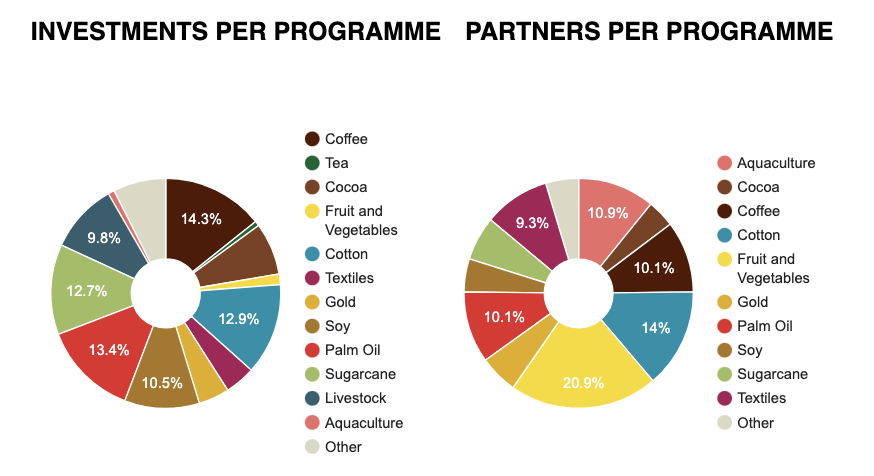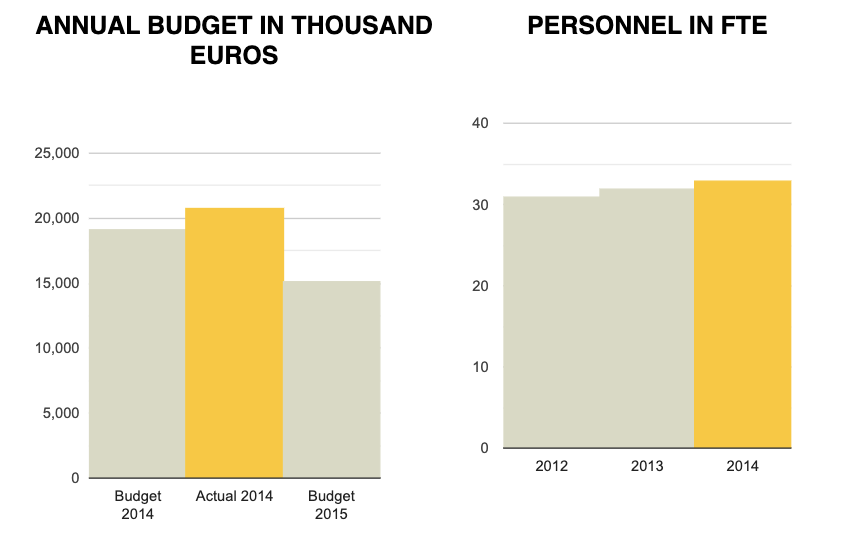REGIONAL COMMODITY PROGRAMMES
Social, economic, and environmental issues run deep in gold mining. Solidaridad Netherlands’ partnership with Kering brand Gucci has facilitated the purchase of 30kg of responsible gold from Peru— the largest single sale of certified, fully traceable gold to date.

Solidaridad Netherlands and partners have worked to increase the uptake of sustainable cotton in European markets and made progress towards a fully sustainable cotton sourcing industry.

Solidaridad Netherlands collaborated with civil society organizations to launch the Coffee Barometer, which illustrates how coffee-growing areas are some of the most vulnerable regions on the planet to climate change. The initiative serves as a wake-up call to make the supply chain more sustainable.

Solidaridad Netherlands’ tea programme has trained its sights on Europe, where sustainable procurement and tea production concerns are falling behind targets. We aim to use our networking capacity in civil society to reestablish the sector’s commitment to 100% sustainable production.

Solidaridad Netherlands was an active participant in the International Cocoa Organization (ICCO), culminating in a keynote presentation at the ICCO’s World Cocoa Conference on securing the future of cocoa farming.

Solidaridad Netherlands and FrieslandCampina Riedel are working together on more sustainable approaches to two of the latter’s juice brands, making labour conditions and sustainable cultivation the basis for holistic sector transformation.

Solidaridad Netherlands and H&M have announced a strategic partnership for sustainability in the textile supply chain, illustrating how business and civil society can combine their resources to tackle problems facing the fashion industry.

As a result of years of advocacy by Solidaridad and other NGOs, increasing numbers of European companies are committing themselves to buying certified soy. But there is much work still to do.

Good labour practices are integral to the creation of sustainable supply chains. Solidaridad Netherlands and Verité have begun developing a labour-audit toolkit to improve the implementation of Roundtable on Sustainable Palm Oil (RSPO) criteria.

La Isla, in Nicaragua, is known as the Isle of Widows because of the prevalence of chronic kidney disease, which disproportionately strikes sugarcane cutters. Solidaridad is running a three-year project, backed by the Dutch Postcode Lottery, to end this disease and secure a future for these communities.

Solidaridad Netherlands and our partners Seafood Connection have connected 3500 smallholder organic shrimp farmers to European markets, shipping eight containers of black tiger shrimp from Bangladesh and ushering in a new era of sustainability in aquaculture.

Smallholder farmers in Bangladesh have benefited from Solidaridad’s support through better farm management, milk quality, self organization and market access. Meanwhile new programme proposals have been developed with donors and companies in the extensive global livestock sector.

EXTERNAL DEVELOPMENTS
The unbalancing effects of the economic crisis can still be felt. National governments now provide less grant funding. Loans, guarantees and equity for investments are becoming more and more important for financing development work. While some companies focus on short-term cost reduction at the expense of people and the environment, many large companies are taking ownership and control of supply chain sustainability and community development. CSR policies, factory improvement programmes and stakeholder dialogues are increasingly being initiated and managed by corporations themselves.
This positive development is in line with everything Solidaridad stands for. Our strength lies in our ability to bring different stakeholders to the table and to foster dialogue on supply chain sustainability – how it’s implemented, managed and improved. Increasingly, large companies are playing this role and, while this trend is welcome and in line with Solidaridad’s vision for ‘change that matters’, it challenges us to discover new ways of being even more effective in the future.
The world is currently in the middle of a data revolution, and information technology has tremendous potential to support farmers through ICT-based services in finance, market intelligence and education. The Dutch Ministry of Foreign Affairs is committed to working with open data and at Solidaridad we have already made use of open-data standards in our Farmer Support Programme.

RESULTS AND PARTNERSHIPS
A part of our mandate is to strengthen European sustainable market development and, to this end, we have established and maintained relationships with 93 European companies, brands and sector organizations. Major partnerships include that with H&M, which is designed to improve the sustainability of their entire supply chain, and with Unilever, which entered into a cross-cutting, multi-commodity partnership with Solidaridad, focusing on changing the lives of a million small-scale farmers. Solidaridad is the first NGO to have engaged in a joint business development partnership with Unilever.
We supported our key donor, the Dutch Ministry of Foreign Affairs, during visits to China which were designed to establish a Chinese sustainable palm oil platform. The Ministry and Solidaridad collaborated on textile production in Bangladesh and, in the Netherlands, on sector-wide sustainable procurement agreements, emphasizing the involvement of emerging economies in sustainable production and consumption. Solidaridad is one of the 25 organizations which are eligible for a strategic, five-year partnership with the Dutch Ministry of Foreign Affairs and we will continue to work closely with the Ministry in developing new partnership programmes.
In 2014, we worked diligently on our brand image and positioning in order to attract new partners and donors. Campaigns for cocoa and sugarcane received positive industry and media attention, and news items and stories were picked up by prominent domestic and international media outlets, including the BBC and the Dutch newspaper Volkskrant, thus strengthening Solidaridad’s position as a global player in supply chain sustainability.
Ample media presence, the use of multi-media productions and storytelling also had a positive effect on fundraising: innovative on- and offline activities designed to address new audiences and direct-mail campaigns targeting existing private donors raised enough funds and public support to enable us to raise further funds at larger institutions.
Friesland Campina Riedel and Solidaridad signed a multi-year partnership, focusing on improving labour conditions as well as sustainable production of mangoes and oranges. Since Friesland Campina Riedel is a relatively small player in the international market, other key players in the fruit and juice sector will be involved to ensure long-term positive impact.

DONORS AND ORGANIZATIONS
The Dutch Ministry of Foreign Affairs is our single most important donor and we are currently developing a strategic five-year partnership with the Ministry, starting in 2016.
The Dutch Postcode Lottery’s relationship with Solidaridad began in 2009 and to date we have received €12 million, including a multi-million, multi-year partnership with our sugarcane programme.
Solidaridad Netherlands receives donations from a large group of loyal supporters. Together these private donors account for a significant proportion of our annual income (in 2014, almost €1 million was donated). Maintaining and expanding this group is a key component in our overall communication strategy.
The Solidaridad Network broadened its donor base to include more public and private donors, spanning Europe, the US, Latin America, Asia and Africa. Donations managed from the Netherlands in 2014 included government funding from the European Union, Ireland, Norway, Switzerland and the Netherlands, as well as private funds from across Europe.
Total income in 2014 was €21,150,263, an all-time high. Our programmes received 85% of this funding directly (other costs include fund raising, organizational and communication costs). Costs as a percentage of income from fundraising were 9%, well below the Netherlands’ Central Fundraising Bureau’s (CBF) norm of 25%. During the year an average of 31.5 full-time staff were under contract.
